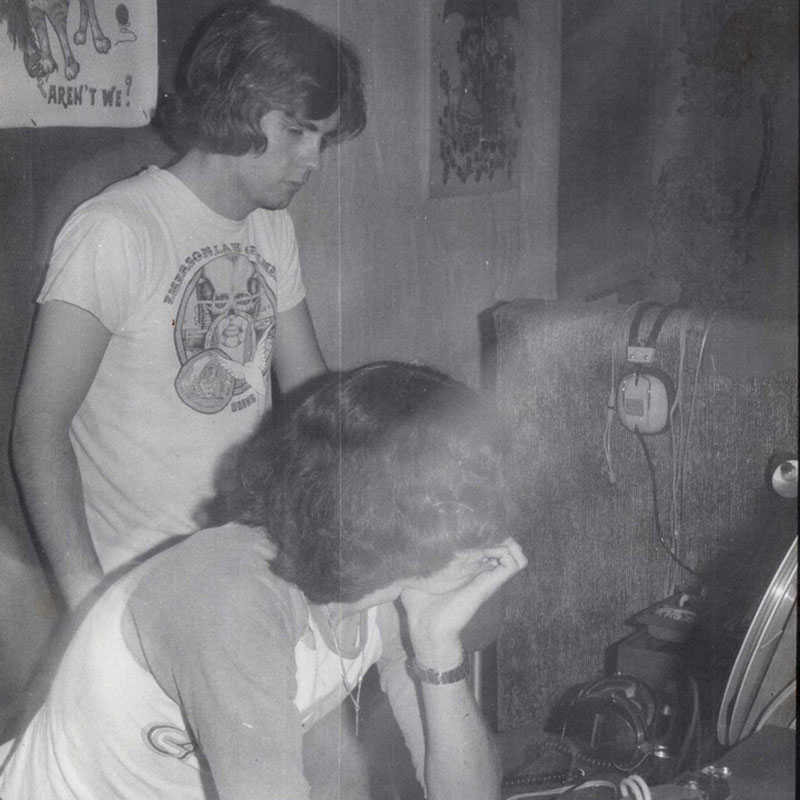Spiny Normen | Interview | “Lost Echoes of the ’70s Freak Scene”
Spiny Normen is the kind of band you might stumble upon in the musty back pages of a record store, the kind that’s been sitting there since the late ’70s, just waiting for someone with the right ear for obscure psych-prog.
The band was formed by Gerry Diaz and Steve Brudniak, who met in high school and bonded over their shared love of music. They initially played a mix of original songs and covers, eventually focusing solely on their own material, which included intricate compositions like ‘Arrowhead’ and ‘The Sound of Younger Times.’ Their rehearsals often took place in a house they called the Orange House, a hub for local freaks. Despite their potential, the band struggled and could never quite anchor their rhythm section, and this instability gnawed at the band’s potential like a hungry ghost. Their recordings, raw and untouched, languished in the archives of Alvin Community College, unheard and unheralded for years. It’s almost poetic that it took decades for their music to resurface, like a message in a bottle finally washing ashore, ready to be deciphered by a new generation of freaks, thanks to RidingEasy Records!
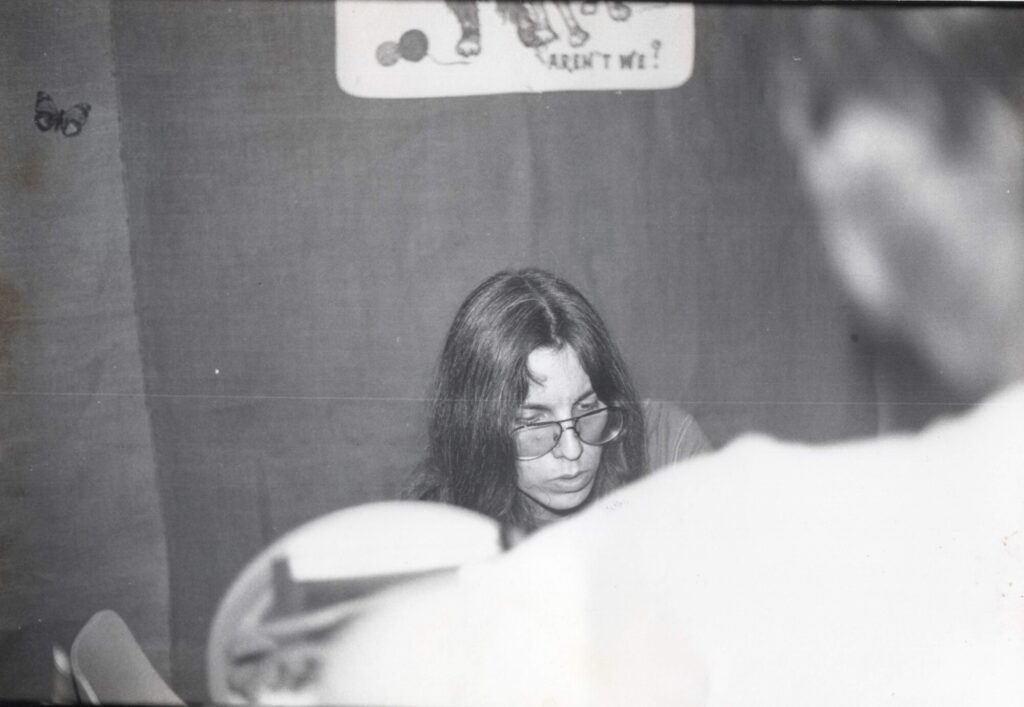
“I wanted to create something no one else had ever thought of”
It’s fantastic to have you. Were you surprised when RidingEasy Records found you and offered an album deal?
Gerry Diaz: Thanks for having us! Psychedelisize indeed! Well, yes, one always hopes for good things like that to happen. We were lucky we had songs ready to accommodate the request.
Steve Brudniak: I was surprised that someone was willing to take on something so old and unpolished. Initially, Shroom Angel Records in Houston had it on their agenda, and they sold it to RidingEasy after Daniel heard it and offered to take it on. We recorded most of it before we had rehearsed enough and with the short amount of time we had in the studio, so there are a lot of little timing hiccups, etc. I was also forced to play drums on a few tracks due to our drummer not being available for a session.
It must feel amazing to have a record out after so many years…
Gerry: Yes, pretty trippy indeed. The records arrived at my house on my birthday!
Steve: I always say my 19-year-old self is turning backflips. At 62 now, I’m still proud of what we did, considering we went from barely playing our instruments to creating some of the crazy, complex stuff we managed to get through by the skin of our teeth! Like ‘Sound of Younger Times’ and the quirky time signature in ‘Arrowhead.’
Listening to it today, what are some recollections that run through your mind when hearing that material?
Gerry: The creative aspect of translating what we heard in our heads through our instruments… a bit unhinged compared to what was going on around us with our peers.
Steve: Living at the orange house (the one Gerry mentioned) in Houston with all these hippies crashing over there. Stuffing our pockets with pizza from the all-you-can-eat Pizza Hut and bringing it back for the stragglers. Also, some bad acid trips!
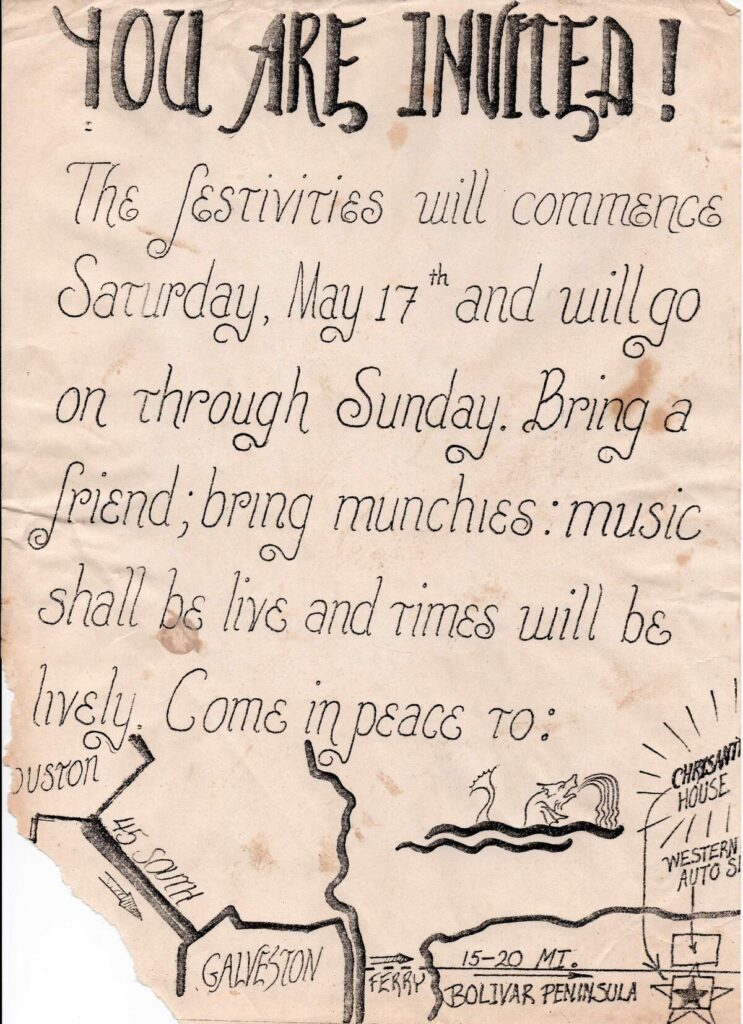
How did you two originally meet?
Gerry: I remember Steve from junior high. I moved away for a few years and came back to the neighborhood high school for freshman year. I had classes with Steve, but we really hit it off in our second-year speech class. Our instructor at the time, Claude Cook, a veteran soap opera actor, would often let us go down the hall to the theater and jam on the piano during class time.
Steve: I think Gerry fielded that question pretty well. I do remember him telling me I needed to buy a keyboard after a few jams around the piano at the school. That led to my getting the Vox, and we began.
Do you remember any profound moment when you knew that you wanted to become a musician?
Gerry: It seems I was always musical in some form. I can remember, as a wee lad, riding in the back of my parents’ car with the radio on, daydreaming that I was the singer performing the song on stage. I guess my folks thought so too and sent me to piano lessons in the second grade. I lost the piano when my dad went back to TXA&M, but I got a guitar when I was 12. Maybe that’s when it happened…
Steve: For me, it was after writing and playing our first original song, ‘Carry Your Water.’ I was so blown away to see something come to fruition and thought it was a great rock song. It turned out to be a DJ in New Jersey’s top song pick for the year at some station a few years ago. It’s amazing that we have gotten so much international attention and radio play so long after. It’s something we would have given the world for back then!
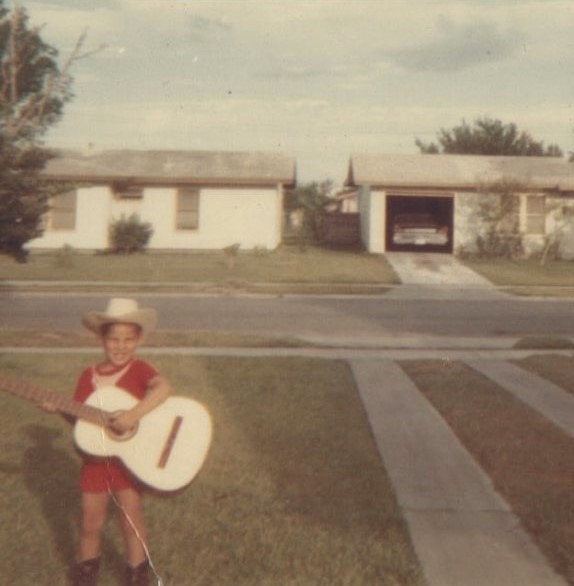
Can you elaborate on the formation of Spiny Normen? What was the main concept behind it?
Gerry: Getting back to school junior year after a somewhat hooligan summer, I was a mess and wound up in rehab. Steve informed me before that he had purchased a keyboard, a VOX Jaguar, which turned out to belong to Fever Tree. Part of my rehab was to live at a halfway house downtown. Some of my buds found out where I was and would pick me up to jam with Steve. That was the germination point. I knew I had to get my act together to learn the guitar better, and that helped tremendously.
The concept was writing original music. I eventually took some guitar lessons and learned how to play songs by ear. However, it seems that Brudniak was already writing and encouraged that we write our own material. So we delved into experiences we knew from the neighborhood—the kind that got me into rehab in the first place. If you listen to the work of fellow neighborhood pals Bill Hicks and Clint Black, you might get a hint of what was going on then. We drank the same water; ours might have been a bit more fizzled, if you know what I mean, but we all crossed paths nonetheless.
Steve: Gerry’s enthusiasm for forming a group was contagious, and he convinced me to do something I wouldn’t have had the courage to do on my own. Just simply dorking around jamming and then seeing songs appear out of our efforts was like finding gold in the first place you dig. I wanted to create something no one else had ever thought of, and I was a big fan of Yes, Tull, and Pink Floyd—prog rock. That music always seemed more thought-provoking and thought out, so I wanted to see if we could do something in that vein but with a harder edge. I didn’t like the idea of playing covers.
Were you influenced by progressive rock bands? What would you say were some of the seminal influences for you?
Gerry: I believe so, yes. Mike Oldfield, Pink Floyd, Uriah Heep, Jeff Beck—early on, but after we started writing, I tried not to listen to that genre so I could rely on original musical thoughts in my writing. I started out in my guitar quest learning hard rock songs I knew: Montrose, Alice Cooper, Thin Lizzy. Having been born in Detroit and brought to Texas after the ’68 riots, I found out later that most of my guitar records were Motor City favorites. I guess that is in my DNA as much as what we were writing in Spiny Normen.
Steve: On top of the prog and psych bands mentioned, there were, of course, the Beatles early on as a kid, rockers like Aerosmith and Black Sabbath, but finding King Crimson was the big score for me. I remember hearing ‘Court of the Crimson King’ and ’21st Century Schizoid Man’ on the radio and just losing my mind.
Were there any lineup changes in Spiny Normen?
Gerry: When we went into the studio for the first time, our drummer, Norman Davis, didn’t show up, and Mrs. Barrett, who owned the studio, called a drummer we did not know to sit in on the recordings. Hence the inspiration for the name suggested by our bass player at the time, Steve Koch. Bruce Salmon played bass with us live, but we did not get a chance to record with him, same with Jeff Pollack. We also had Randall Haak on upright bass on the album, Terry Farley recording/live, Boris Meunch live, Robert Winters live and recording on drums, and Bob Reilly on vocals live.
Steve: It seems we were on a never-ending chase for drummers and bass players. I think Robert Winters killed it the best as our last drummer. Listen to him knock out the crazy changes and flips on ‘Sound of Younger Times.’ Riding Easy should have made that the first track! LOL. I think I asked them too! Daniel?
What kind of venues did you play? What are some of the bands you shared stages with?
Gerry: We played at rock bars, parties, and an open market thrown in for good measure. We did not gig much during our time, so not many bands to note here.
Steve: We made it to only a few underground clubs usually reserved for punk. We were from an era too late and now obviously too early. I think we’d have a good audience today.
Gerry: Here are some gig stories I can share. The weekend psychedelic party on Bolivar Peninsula (a ferry ride from Galveston) was a convergence of art hippies, heads, and probably a few self-proclaimed sorcerers for good measure. Everyone was lit except for me, just being out of rehab and all. I know there were two bands that played for sure: Spiny Normen and some mates from the Orange House. I think they were called The Cosmic Headband at the time. Jeff Pollack played bass for both bands, and Brudniak and I helped them with a Doors tune, with B on keys and me on vocals for “LA Woman.” The Headband were a jam band.
We got there early in the day, and I recall some skinny dippers frightening an unsuspecting young family who were happily walking along the beach. Well, until they encountered the nudes and quickly turned around to whence they came. I saw this from the second-story porch facing the gulf while I was practicing my guitar for the night’s show. Of course, during the show, a noise complaint to the cops by the neighboring beach house was a drag since there were not many folks on the beach besides us. I believe the show might have ended early, but I don’t think anyone got in trouble.
Our friend and classmate of B, Wesley Archer (now a successful animator and producer), was there. I remember vividly winding down after the show. He was leaning in a doorway while many folks were listening to music in the living room. He stopped leaning against the doorway to stand up for a second, and when he went back to leaning, he missed the doorway and crashed into the record player, disrupting the tranquility, shall we say. It was pretty funny. He went on to say, “I’m sorry, I owe you a million dollars.” It was hysterical. Wesley also filmed Spiny Normen when it was just me, Steve, and Norman jamming at Norman’s garage.
All in all, we did our set well, I thought, even though the band atmosphere was quite the trip.
Spiny Normen got their first club gig at a place downtown off Main Street called Rock Island. The club eventually became the punk rock mecca of town and was renamed to just The Island.
We did two nights opening for a rockabilly act called The Finns. It seems we had a stand-in drummer for those shows, having covers and original Spiny Normen tunes. I think we were well received. However, after the show, the lead singer for The Finns complained to me that someone had spit on him onstage and claimed they knew me. Turns out it was a classmate of mine from art school. She was a huge punk disciple, and well, there you go.
We played The Island again, opening for The Finns. One of the nights was slow, and Phil, the owner, decided to close a bit early. That night, the unassuming doorman, who we monikered early in the day as Mr. BandAid Head due to a prominent first-aid tape on his somewhat bald head, got some customers. Leaning against the bar where I had a full view of the front door, I waited for Brudniak, who went into the office to get paid. Two club goers came to the front door, and Mr. BandAid Head informed the duo they were closed. They ignored the notice and proceeded to walk past the doorman. Before you know it, Mr. BandAid Head put one in a headlock and the other on the ground with his foot on his chest at the same time. He goes, “I said we were closed!” Well, to my right at the end of the bar, the bartender, seeing what was going on, opened the cash register and pulled out a piece. He ran over to the melee and started pistol-whipping the gate crashers. Well, the few people that were there were either with the band or worked at the club. They started yelling at the bartender to stop, trying to physically restrain him. Even Mr. BandAid Head let go and was trying to restrain the bartender. Someone broke a pool cue over the bartender as well, and that barely slowed him down. Eventually, he stopped, but it was a mess all pretty much happening in front of me. The gate crashers were able to leave kind of unnoticed. I followed them out the front door. I could see they were a bit bloody as they walked away, and I heard one say, “I told you we shouldn’t have gone in there.” As I walked back into the club, Brudniak was just coming out of the office, and I said, “Dude, you missed it.” Luckily, everyone was able to walk away.
Our bass player Bruce Salmon was also in a band with Bill Hicks. I remember seeing Bill at one of the Spiny shows at The Island.
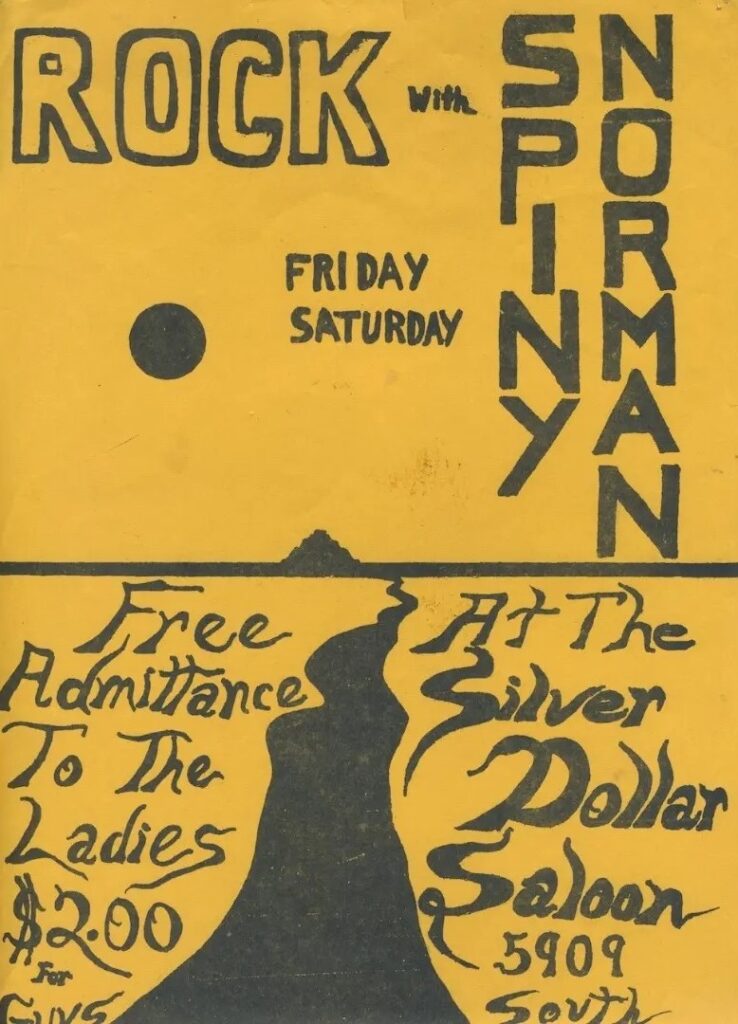
“We are all heads”
Were you aware of the first wave of psych rock bands from Texas like 13th Floor Elevators? Houston had Lost And Found.
Gerry: After Steve rented a place we called the Orange House because… well, it was orange, Spiny Normen was able to rehearse on a regular basis. A lot of psychedelic enthusiasts would hang out, and Jeff Pollack, an eventual bass player if I remember correctly, officially lived in the Orange House as well. There was a lot of music on the turntable, some I was familiar with, and some was new. The Elevators were on that turntable quite often. We were aware of Texas psych rock bands. As the Elevators stated on American Bandstand, “We are all heads.”
Steve: Yes, but I really learned more about these guys later. Here’s a little tidbit, though: I later learned to be a pretty good drummer (I went on to do that instead of keys and flute in Austin). I played some impromptu gigs with Fred Mitchim’s band called The Tommy Hall Schedule (Tommy from the Elevators). All we played were Elevators tunes. Eventually, Fred joined the Elevators on guitar a few years back when they reformed and did a few tours.
I was able to see the Elevators on an earlier regrouping in the 80s when I was helping run the Consolidated Arts Warehouse venue with George Horan (who also managed the famous Electric Light Circus back in the 70s). I had a fairly short but interesting conversation with Roky Erickson, who was spending a lot of time walking in figure 8s and chain-smoking before the gig started.
What’s the story behind your unreleased album? Where did you record it? What kind of equipment did you use and who was the producer? How many hours did you spend in the studio?
Gerry: After rehab, I was able to get my act somewhat together and passed the audition into the art department at the High School for Performing and Visual Arts. I was able to walk from the rehab house to the art school and audition. Actually, one of the folks at the rehab house was a substitute teacher there and encouraged me to audition. While at HSPVA, I gigged with Spiny Normen. Alvin Community College came recruiting my senior year. They informed me of a multi-track recording class, and I thought, what a great way to get the band on tape—a gateway to having a record.
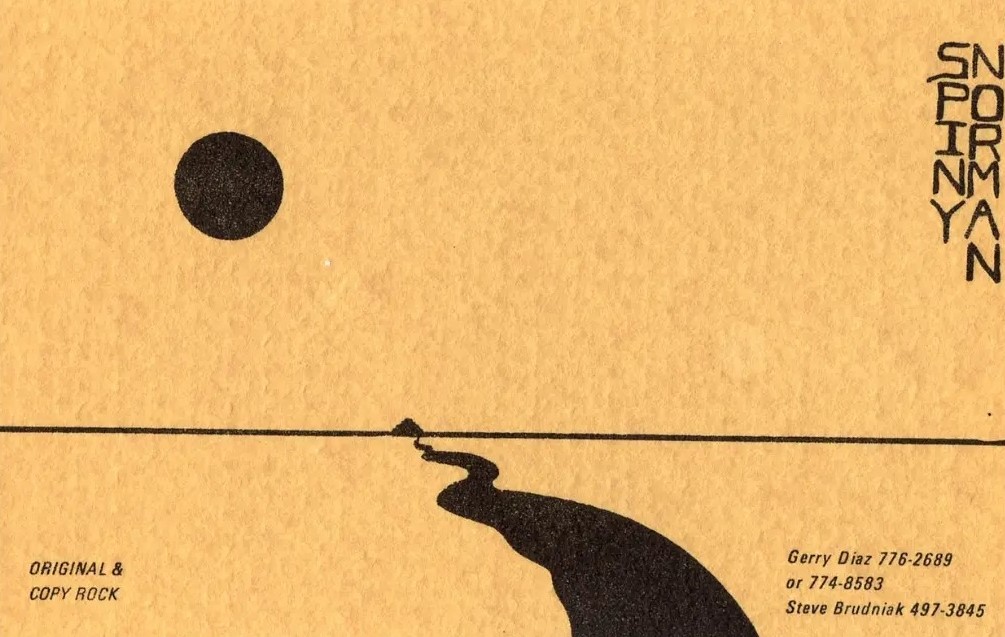
We recorded at Alvin Community College band hall where the recording control booth was housed. Tascam 80-8 1/2 inch tape machine, Tascam M5 recording desk, JBL 4311, and Auratone monitor speakers were used. I would say three, maybe four weekends. We had a bit of the run of the place because not many of my classmates had large recording projects like a band, so that gave us some free range of the studio time as well as band hall instruments.
Steve: I think Gerry covered that. I will note that somewhere along the way, one of the 1/2 inch 8-track tapes went missing, so there is that out there waiting to resurface. There was also another small label looking at doing the album before Shroom Angel got hold of it… Gerry can tell you the name, but between them and Shroom Angel, and who knows how many garages it was stored in, it went missing.
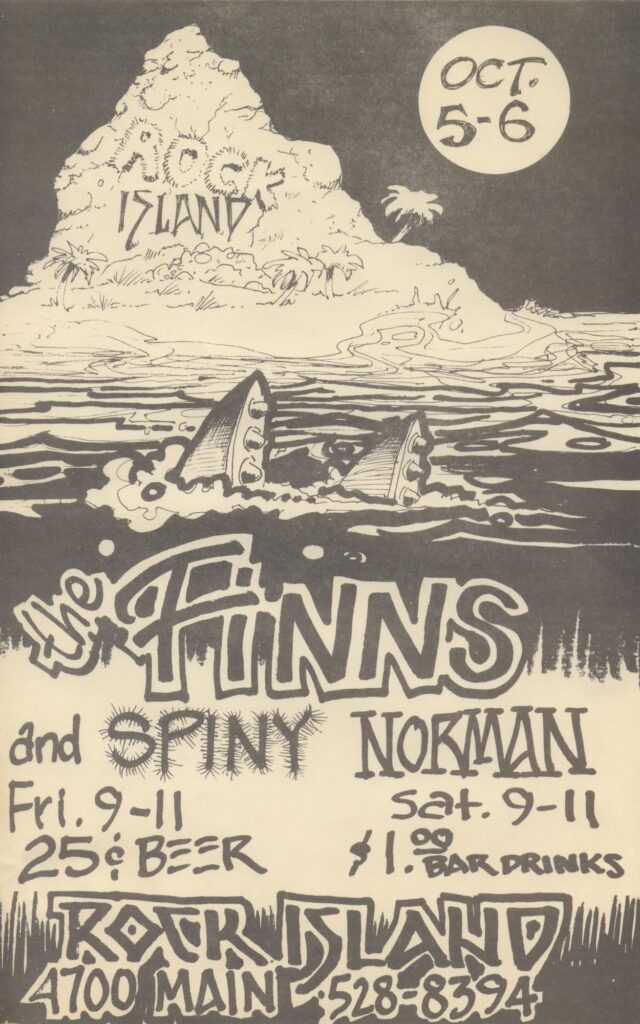
Would you share your insight on the album’s tracks?
‘Arrowhead’
Gerry: First crack at my new analog delay on guitar.
Steve: I was getting very interested in bizarre time signatures, and we had just barely learned to play it before we recorded. You can hear the struggle there in a few spots. It is a surrealist, poetic story that was inspired by a class photo I had with a haircut that made me think of an arrowhead.
‘Wrecko Wild Man Ride’
Gerry: A great mellotron vehicle as well as turning the tape around to get real crazy before echo on the vocals. A Morley fuzz wah/volume pedal adventure for me as well.
Steve: All about a bad acid trip I experienced at the notorious Orange House. I had to be hog-tied in the end by all the hippies and came out of it from a completely different world. Still recovering… This was the first song that took us out of garage rock into deeper, more complex psychedelia.
‘Carry Your Water’
Gerry: A definite vocal exercise part that I did not really think or intend to make it to tape. Singing in that huge tall ceiling band hall was a trip.
Steve: Again, the first song I ever wrote! Gerry’s guitar solo is historic, in my opinion. I wish I had hit the harmonies a little better. I’m hoping one day AI could clean up all these tracks and produce a 21st-century polished version. I think the music deserves a “what if” presentation remix. Any producer takers??
‘The MonkeyWeasel’
Gerry: We used some canned playground and chimp noises that were in the recording booth library. I’m guessing Mr. Rogers never got to hear our praise of him.
Steve: About childhood fears and growing up through them. The reference to the traditional English song ‘Pop Goes the Weasel’ is, of course, why the ‘MonkeyWeasel’ was born in the mulberry bush. Someone add this to that song’s Wikipedia! I wanted to translate a dark organ grinder/circus music theme into dark psych rock.
‘To Meet The Mad Hatter’
Gerry: A song I was not initially on until we needed a bit more material for the album. The basic tracks are Steve and Kirk Ayton. I had left Spiny Normen by then, wanting to do a bit more traditional rock performances, shall we say, and get that out of my system. I added my guitar part recently. I’m on the right.
‘The Bell Park Loon’
Gerry: A late-night exploring outing at Houston’s downtown Bell Park resulted in Steve’s poem, and I remember coming up with the guitar riff a bit instantly. Recording was quick and strong.
Steve: Yes, Gerry and I met this schizophrenic character on a night walk through Bell Park in the Houston Montrose area near all the museums. It might have been the first flute number we did. I just remember Gerry playing that riff, and I jumped in on the flute one day. I used a distortion unit on the vocals because I wanted them to sound like ’21st Century Schizoid Man,’ which I am just now, ironically, realizing connects to the lyrics I had written. Wow… too much acid, I suppose.
‘In The Darkness Of Night’
Gerry: I can picture my Fender Twin in the big band hall cranked and Steve playing on the band hall’s drum kit. Running into the booth to stop recording… we were the only ones there.
Steve: There were a lot of rough times attempting to play the drum track for our absent drummer that session! It’s an exhausting song on the keys too. I still find myself singing that song in my head to this day. Gerry’s writing entirely. Great visuals and poetry: “In the darkness of night, as evil pertains; relations dealing with the unknown dwell unknowing of their pains. Hot streams of weary blood pump through their minds, staying in cavities which are forever reaching.” Rolls off the brain nicely.
‘The Sound Of Younger Times’
Gerry: Randall Haak on upright bass, an Alvin CC classmate of mine. Great all-around bass player is an understatement. It seems he got it on the first take.
Steve: I think it was our masterpiece and last song as a group. That recording has the best flute solo performance I ever did. I must have hit some of it by mistake because I don’t think I ever played that well again. So much went into that song writing-wise and recording-wise, and having the stand-up bass addition by Randall, who jumped in on our session one day, warping around with my mellotron cello, was a real blessing. I think music like that would have been our trajectory if we had stayed together. I was already writing ‘To Meet the Mad Hatter’ when we broke up, which was even more complex and trippy. We had to pull that from a very old cassette, by the way. It took a lot to clean it up as well as we did, so Gerry added guitar for the album to that. I was working with guitarist Kirk Ayton, who later played in the band Worlds. He learned guitar from Mike Knutz of Fever Tree, and as Gerry said, I owned their old Vox Jaguar, by the way.
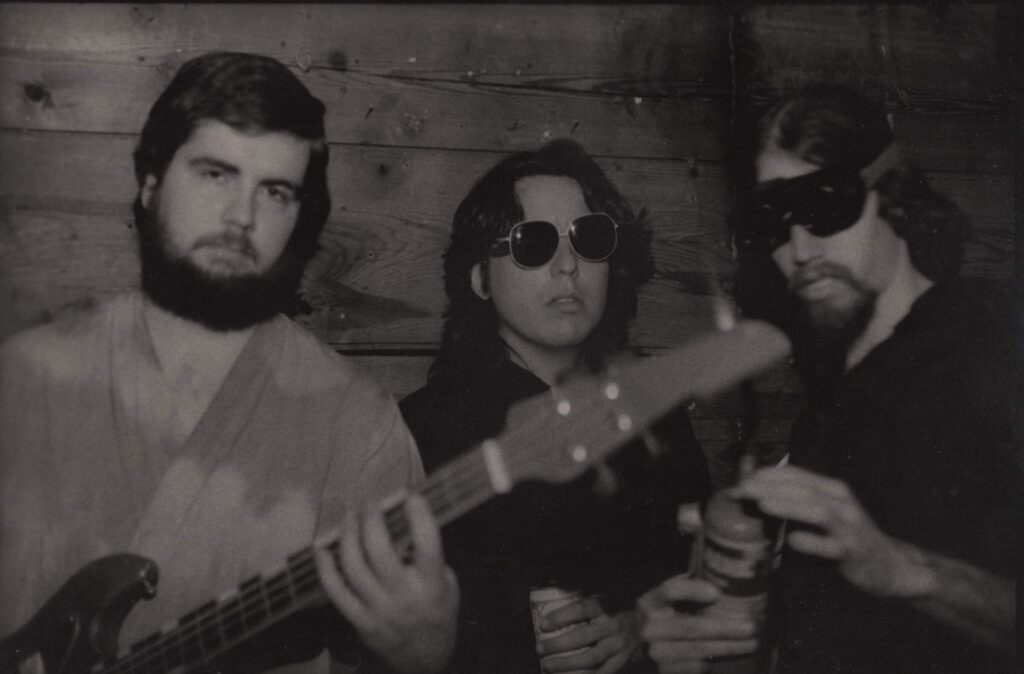
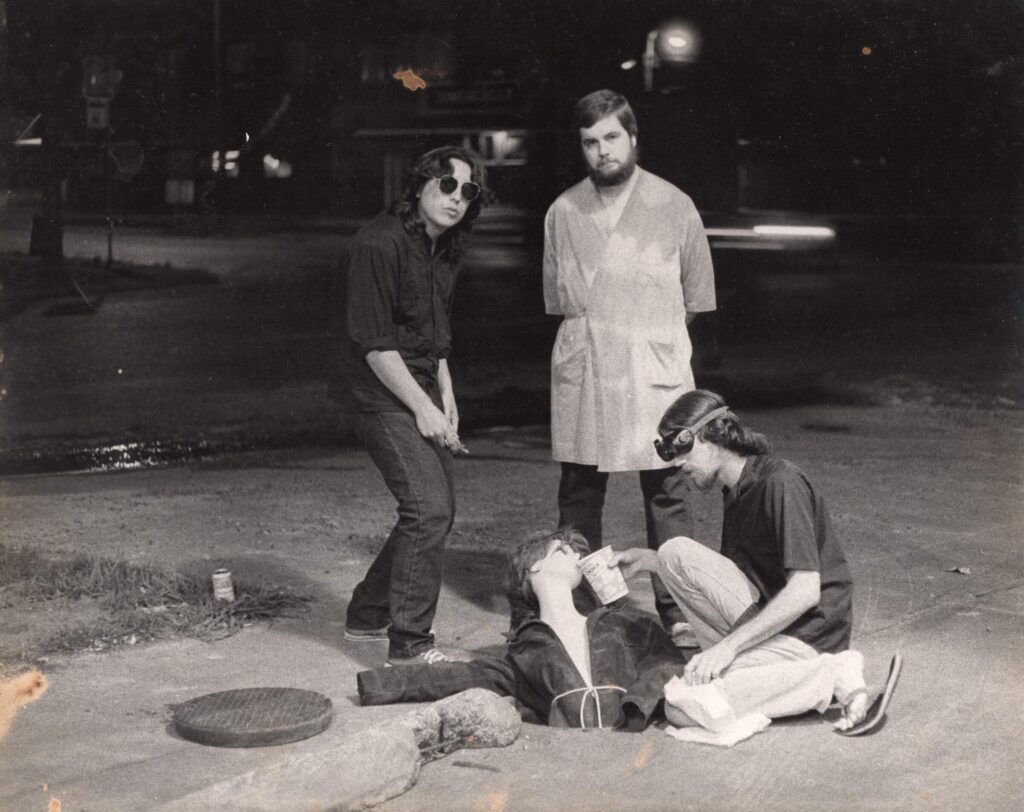
Are there any other unreleased materials available by Spiny Normen or even related projects?
Gerry: Well, we did a project called Mr. Greengenes… Steve Koch on bass and Brudniak on drums with me on guitar. Songs I wrote after Spiny Normen in a band I had called Airbath, and new songs as well. Instrumental and improvised music to Brudniak’s poetry. I have some tapes mastered that need to come out.
There is also a project we call PsyloBison… improvised guitar loops with a sine wave generator and theremin. PsyloBison’s name is an ode to the old neighborhood.
Steve: Again, there is the lost tape of Spiny Normen and, as Gerry mentioned, the Mr. Greengenes project from the 80s and the ongoing PsyloBison. We haven’t picked it up in a few years. I’m on theremin and a Wavetech tone generator, and Gerry is on guitar with effects—or rather, effects with guitar!
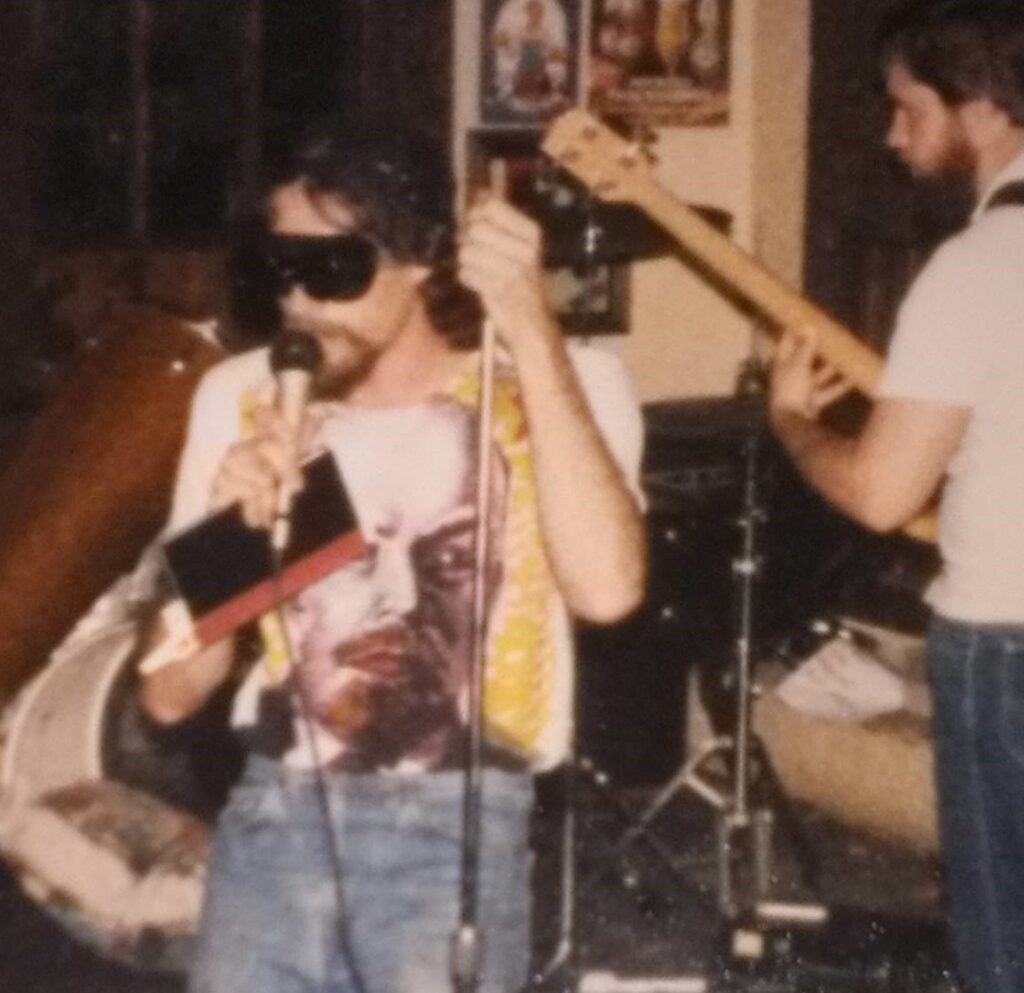
When was the material recorded?
Gerry: Spiny Normen is a late ’70s adventure.
What did your repertoire consist of for live gigs?
Gerry: At first, we would do our songs as well as cover songs. We eventually got rid of the covers.
Steve: Everything on the album, if I’m not mistaken. We also had a couple of Cream songs: ‘White Room’ and ‘Sunshine of Your Love,’ Jethro Tull’s ‘Cross-Eyed Mary’ and ‘Locomotive Breath,’ ‘Hocus Pocus’ by Focus, and oddly, The Cars’ ‘Let the Good Times Roll’ and The Who’s ‘Baba O’Riley.’
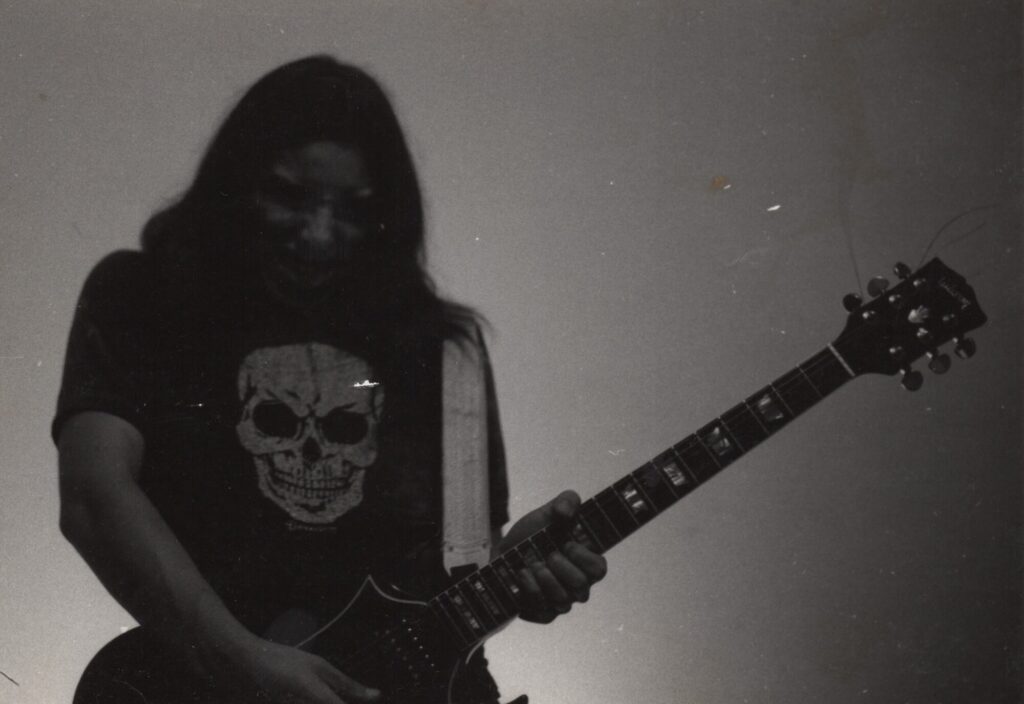
What followed for you?
Gerry: After Mr. Greengenes, I started a band called The Trolls in Houston and kicked around town for quite a while. At the same time, I became a professional audio engineer, working in nightclubs and traveling with bands, festivals, concerts, corporate events—just about every type of sound gig you can think of. One of the long-time drummers in The Trolls, Patrick Earle, left to tour manage his brother Steve. I was able to fill in as a monitor engineer for about a year, touring the States and Europe.
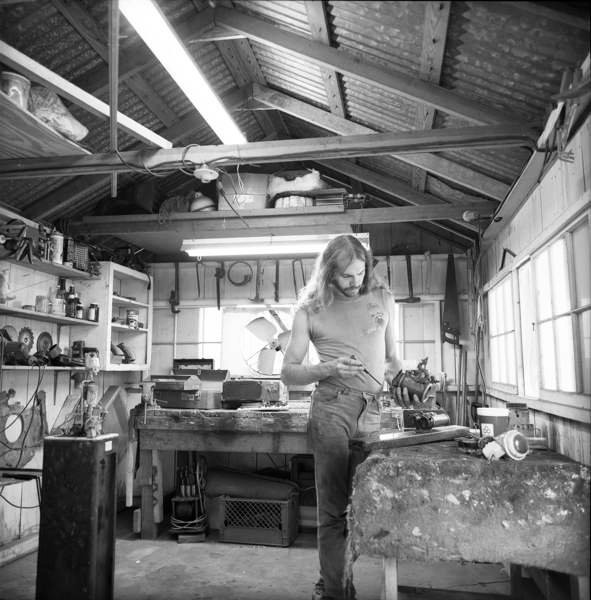
Steve: I continued to play in bands after moving to Austin but as a drummer. None really went anywhere: Karmen Jade, Dog Head, The Korkus, and The Tommy Hall Schedule. I was already making a career as an assemblage sculptor, which I still do. (I had a show in Houston in May at Reeves Gallery). I also got back into film, which was my pursuit before Spiny Normen, but now as an actor. Recently, I had some scenes with Ben Affleck in Robert Rodriguez’s film Hypnotic. It didn’t do well at the box office…
I also ran a recording studio (Victorian Recording) in Houston back in the early ’80s and recorded many of the punk and metal bands of that time. I produced the Party Owls’ first 45; they later became Sugar Shack. I also worked with Bark Hard and a bunch of other bands. I did some demo work for Rocky Hill, Dusty Hill’s brother from ZZ Top. There was a band called Strapped that got national play on the Dr. Demento show with ‘Whip Me Beat Me Call Me Edna’ and ‘Santa’s in the Slammer.’
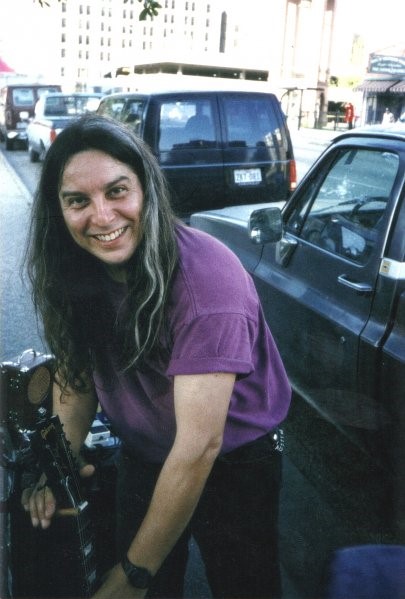
What currently occupies your life?
Gerry: Right now, my family—my wife Melissa and my 12-year-old son James Eagle. My day job is as an audio engineer, and I do solo performances as Joseph Lonefeather.
Thank you for taking your time. Last word is yours.
Gerry: Klemen, thanks for reaching out to us and giving us notice. Do give yourself a chance and taste our biscuits…
Steve: Thanks for keeping this kind of music alive. I think it was a time when rock was really becoming more artistic and more complex. That turned around as punk kind of changed things, so I think future generations will appreciate it even more. I’m happy Spiny Normen got a little niche in history. It was the focus of my entire world at the time, and I think we all wanted the work to affect people. So thanks for being there to share the lost and found of so many bands!
Klemen Breznikar
Headline photo: Spiny Normen
Permanent Records Official Website / Facebook / Instagram / Twitter / Bandcamp
RidingEasy Records Official Website / Facebook / Instagram / Twitter / Bandcamp / Tik Tok / YouTube

